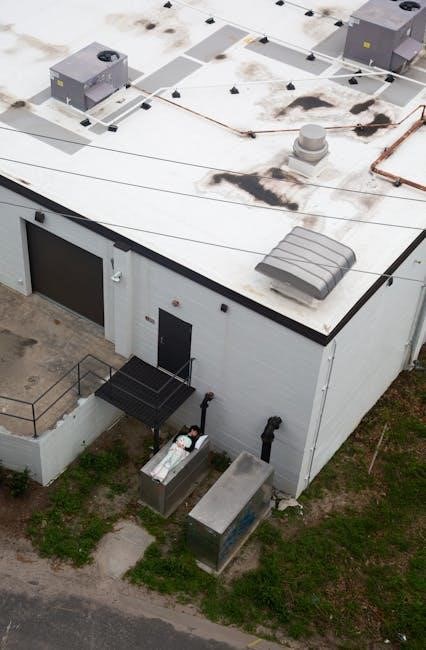An HVAC maintenance contract is a legally binding agreement between a service provider and client, outlining scheduled maintenance and repair services for heating, ventilation, and air conditioning systems. These contracts ensure regular system upkeep, preventing failures and optimizing energy efficiency. They are customizable to meet specific residential or commercial needs, offering peace of mind and cost savings through proactive maintenance.
What is an HVAC Maintenance Contract?
An HVAC maintenance contract is a formal agreement between a service provider and a client, detailing the terms for maintaining and servicing heating, ventilation, and air conditioning systems. It outlines the scope of work, including routine inspections, repairs, and replacements, ensuring optimal system performance. These contracts typically cover scheduled maintenance visits, emergency response protocols, and priority service. By signing such a contract, clients receive consistent support, reducing unexpected breakdowns and extending equipment lifespan. The agreement is customizable to fit residential or commercial needs, offering a structured approach to HVAC system care and cost efficiency.
Importance of Regular HVAC Maintenance
Regular HVAC maintenance is crucial for ensuring the longevity, efficiency, and reliability of heating, ventilation, and air conditioning systems. It helps prevent unexpected breakdowns, reduces energy consumption, and lowers operating costs. Proper upkeep extends equipment lifespan, maintains optimal performance, and ensures indoor air quality. Scheduled maintenance also allows for early detection of potential issues, preventing minor problems from becoming costly repairs. Additionally, it enhances safety by identifying hazards such as gas leaks or electrical faults. Regular maintenance is essential for both residential and commercial settings, providing peace of mind and financial savings over time. It is a proactive approach to system care.

Benefits of an HVAC Maintenance Contract
An HVAC maintenance contract offers numerous advantages, including cost savings, improved system efficiency, and priority service. It ensures regular upkeep, minimizing unexpected breakdowns and extending equipment lifespan.
Advantages for Residential Clients
Residential clients benefit significantly from HVAC maintenance contracts, which ensure consistent system performance and energy efficiency. These agreements provide priority service, reducing downtime during emergencies. Regular maintenance prolongs equipment lifespan, lowers repair costs, and enhances indoor air quality. Contracts often include scheduled inspections, ensuring potential issues are addressed before they escalate. Homeowners gain peace of mind knowing their HVAC systems are reliable and functioning optimally. Additionally, maintenance agreements typically offer discounted rates for parts and labor, making them a cost-effective solution for long-term system care. This proactive approach helps residents avoid unexpected expenses and ensures uninterrupted comfort year-round.
Advantages for Commercial Clients
Commercial clients gain significant advantages through HVAC maintenance contracts, ensuring their systems operate efficiently and reliably. These agreements help maintain consistent indoor air quality, essential for employee productivity and customer comfort. Regular maintenance reduces unexpected breakdowns, minimizing operational disruptions. Contracts often include priority service and discounted rates, lowering overall costs. Extended equipment lifespan and energy savings contribute to reduced overhead expenses. Additionally, maintenance agreements allow businesses to budget more effectively, avoiding sudden repair costs. Enhanced system performance also supports compliance with health and safety regulations, making these contracts a vital investment for commercial establishments aiming to maintain smooth operations and optimal working conditions.

Key Components of an HVAC Maintenance Contract
A comprehensive HVAC maintenance contract includes the scope of work, pricing, service frequency, and warranty terms. It outlines responsibilities, payment structures, and termination conditions clearly.
Scope of Work
The scope of work in an HVAC maintenance contract outlines the specific services provided, such as routine inspections, cleaning, and part replacements. It details the frequency of visits, tasks performed during each service, and the systems covered. This section ensures clarity on what is included, preventing disputes. It may specify preventive maintenance procedures, emergency response protocols, and exclusions. Customizable to client needs, the scope of work defines the contractor’s responsibilities and deliverables, ensuring the HVAC system operates efficiently and reliably. This clarity helps both parties understand their obligations and expectations.
Pricing and Payment Terms
The pricing and payment terms section of an HVAC maintenance contract outlines the costs and payment structures. It may include a fixed annual fee, monthly payments, or per-visit charges. Payment terms specify due dates, accepted methods, and late penalties. Some contracts offer discounts for long-term agreements or bundled services. This section ensures transparency, avoiding disputes over costs. It details how and when payments are made, ensuring both parties agree on financial obligations. Clear payment terms help maintain a smooth working relationship between the client and contractor.
Service Frequency and Scheduling
This section specifies how often maintenance services will be performed, typically semi-annually or quarterly, depending on system usage and local climate. Scheduling details include preferred dates and times, ensuring minimal disruption to the client’s operations. The contractor may offer flexible scheduling options, including weekends or holidays, to accommodate the client’s needs. Some contracts allow for priority scheduling during emergencies, ensuring quick response times. By outlining service frequency and scheduling, the agreement provides clarity and ensures the HVAC system receives consistent upkeep, maintaining efficiency and extending its lifespan. This section is crucial for both residential and commercial clients.
Warranty and Liability Clauses
These clauses outline the contractor’s responsibility for repairs and replacements under warranty, as well as limitations of liability for damages. The warranty typically covers parts and labor for a specified period, while liability clauses protect the contractor from claims arising from system failures or delays. Clients should review these sections carefully to understand their rights and protections. Properly drafted clauses ensure both parties are aware of their obligations, minimizing disputes and providing clarity in case of unforeseen issues. These terms are essential for establishing trust and accountability in the HVAC maintenance agreement.
Termination Conditions
Termination conditions outline the circumstances under which an HVAC maintenance contract can be ended by either party. These may include mutual agreement, breach of contract terms, or failure to meet obligations. Typically, a written notice period is required before termination, allowing the other party to address any issues. Termination may also occur if one party becomes insolvent or ceases operations. It’s crucial to review these clauses to ensure they are fair and provide clarity on the process. Proper termination conditions protect both clients and contractors by outlining clear exit strategies and avoiding potential disputes. They ensure a smooth conclusion to the agreement.

How to Create an HVAC Maintenance Contract
To create an HVAC maintenance contract, define the scope of work, payment terms, and service frequency. Use templates to streamline the drafting process effectively.
Steps to Draft the Contract
To draft an HVAC maintenance contract, start by defining the scope of work, including specific services and systems covered. Next, outline payment terms, such as pricing structures and due dates. Specify the frequency of maintenance visits and scheduling procedures. Include clauses for warranties, liability, and termination conditions to protect both parties. Use clear, concise language and ensure all terms are legally binding. Finally, review and sign the contract with both the client and contractor to confirm agreement. Proper documentation ensures transparency and accountability for all involved parties.
Using HVAC Maintenance Contract Templates
Using HVAC maintenance contract templates simplifies the process of creating professional agreements. Templates are readily available online in PDF or Word formats, allowing for easy customization. They typically include sections for scope of work, client details, pricing, and legal terms. To use a template effectively, download it from a reliable source, such as ServiceTitan or HouseCall Pro, and fill in the necessary information. Ensure the template is adaptable to your specific needs and includes all required clauses. If needed, consult a legal professional to verify compliance with local regulations. This approach saves time and ensures a polished, legally sound contract.
Customizing the Contract for Specific Needs
Customizing an HVAC maintenance contract ensures it meets the unique requirements of both residential and commercial clients. Begin with a reliable template, then tailor the scope of work, service frequency, and pricing to suit the client’s HVAC system. For instance, commercial clients may require more frequent inspections and specialized equipment maintenance, while homeowners might prioritize emergency service clauses. Include details like system specifications, coverage periods, and payment terms to avoid ambiguity. Consulting with legal professionals can help ensure compliance with local regulations. This personalized approach fosters trust and ensures the agreement addresses all parties’ needs effectively.

Choosing the Right HVAC Contractor
Selecting a qualified HVAC contractor ensures reliable service and compliance with contract terms. Check reviews, verify certifications, and assess experience to find a trustworthy provider.
Researching Potential Contractors
When selecting an HVAC contractor, thorough research is essential. Start by reviewing online ratings, customer testimonials, and professional certifications. Verify if contractors are licensed, insured, and bonded. Compare service offerings, pricing, and contract terms to ensure alignment with your needs. Request references and evaluate their experience with similar HVAC systems. Check if they provide emergency services and prioritize customer satisfaction. A detailed contract and clear communication are key indicators of a reliable provider. Additionally, ensure they offer customizable maintenance agreements tailored to your system requirements. This due diligence ensures you partner with a trustworthy and skilled professional.
Checking Reviews and Ratings
Checking reviews and ratings is a critical step in selecting a reliable HVAC contractor. Start by visiting platforms like Google, Yelp, or the Better Business Bureau (BBB) to assess a contractor’s reputation. Pay attention to overall ratings and read detailed comments to identify patterns of satisfaction or concerns. Look for feedback on punctuality, professionalism, and service quality. Additionally, check industry-specific forums or social media groups for firsthand experiences. Be wary of fake reviews and ensure the contractor has consistent positive feedback across multiple sources. This due diligence helps ensure you choose a trustworthy provider for your HVAC maintenance needs.
Understanding the Contractor’s Experience
Assessing a contractor’s experience is vital for ensuring reliable HVAC services. Look for contractors with extensive years in the industry, as experience often correlates with expertise. Verify their certifications, such as NATE or EPA, which indicate professional competence. Check if they have handled systems similar to yours, whether residential or commercial. Experienced contractors typically provide tailored solutions and are familiar with common issues. A proven track record ensures they can deliver high-quality maintenance and repairs. Their expertise also helps in drafting clear and comprehensive maintenance agreements, aligning with your HVAC system’s specific needs and local regulations.
Reviewing the Contract Before Signing
Before signing an HVAC maintenance contract, carefully review all terms to ensure clarity and alignment with your needs. Check the scope of work, pricing, and payment terms. Verify service frequency, scheduling, and response times. Look for warranty and liability clauses to understand responsibilities. Review termination conditions to avoid unforeseen penalties. Ensure there are no hidden fees or ambiguous terms. Confirm that the contract aligns with local regulations and your HVAC system’s specific requirements. Asking questions and seeking legal advice if necessary can prevent future disputes. A thorough review ensures transparency and mutual understanding between you and the contractor.

Understanding HVAC Maintenance Agreement Templates
HVAC maintenance agreement templates provide a structured format for creating contracts, ensuring all essential details like scope of work, pricing, and legal terms are included.
Where to Find Reliable Templates
Reliable HVAC maintenance contract templates can be found on professional service provider websites, legal document platforms, or contractor portals. Many companies, like ServiceTitan or HouseCall Pro, offer customizable templates. Legal websites such as LegalZoom also provide editable HVAC contract templates. Additionally, industry-specific forums and contractor associations often share downloadable templates. These resources ensure compliance with local regulations and include essential clauses. Always verify the source’s credibility to avoid outdated or incomplete documents. Using trusted platforms guarantees a comprehensive and professional agreement tailored to your needs.
Elements to Look for in a Template
A reliable HVAC maintenance contract template should include essential elements such as scope of work, pricing, payment terms, and service frequency. It should outline the responsibilities of both parties, including maintenance schedules and emergency repair procedures. Look for clauses covering warranties, liability, and termination conditions. The template should also specify priorities for service calls and include space for customizing details like equipment lists and service levels. Ensure the document complies with local regulations and clearly defines the terms to avoid disputes. A comprehensive template provides clarity and protection for both contractors and clients, ensuring smooth service delivery.
Ensuring Compliance with Local Regulations
When drafting an HVAC maintenance contract, it is crucial to ensure compliance with local, state, and federal regulations. Verify that the contractor holds the necessary licenses and certifications to perform HVAC services in your area. The contract should adhere to safety standards, environmental regulations, and building codes. Review local laws regarding contract terms, payment structures, and dispute resolution. Ensure the template includes clauses that align with legal requirements, such as warranty conditions and liability limitations. Consulting with legal experts or local authorities can help confirm compliance, protecting both parties from potential legal issues. Compliance ensures the agreement is enforceable and meets all regulatory standards.

Common Mistakes to Avoid in HVAC Contracts
Neglecting to read the fine print, ignoring service coverage details, and overlooking payment terms are common errors. Always check for hidden fees and ensure clarity on warranties.
Not Reading the Fine Print
One of the most critical mistakes in HVAC contracts is failing to thoroughly read the fine print. This oversight can lead to misunderstandings about service coverage, payment terms, and hidden fees. Many contracts include clauses that outline liability, warranties, and termination conditions, which are essential to understand. Ignoring these details can result in unexpected costs or disputes. It is crucial to carefully review every section, ensuring all terms align with your expectations. A rushed signing may leave you with an agreement that does not fully meet your needs or provide adequate protection. Always take the time to understand the contract before signing.
Ignoring Service Coverage Details
Ignoring service coverage details in an HVAC maintenance contract can lead to misunderstandings and unexpected costs. Service coverage outlines the specific maintenance tasks, repairs, and replacements included in the agreement. Failing to review these details may result in discovering that certain services are not covered when needed. For example, some contracts may exclude emergency repairs or parts replacements, leaving clients with additional expenses. Understanding the scope of services ensures clarity and avoids disputes. Always verify what is included in the contract to confirm it meets your HVAC system’s needs and provides adequate protection. This step is crucial for a stress-free agreement.
Overlooking Payment Terms
Overlooking payment terms in an HVAC maintenance contract can lead to financial surprises and disputes. Payment terms specify schedules, methods, and penalties for late payments. Failing to review these details may result in unexpected charges or misaligned payment schedules. For example, some contracts may require upfront payments or have strict penalties for overdue balances. Understanding payment terms ensures financial planning and avoids conflicts. Always verify the payment structure, including any hidden fees or clauses, to align with your budget and expectations. Clear payment terms are essential for a smooth and transparent agreement. Neglecting this aspect can lead to misunderstandings and financial strain.
Not Checking for Hidden Fees
Many HVAC maintenance contracts include hidden fees that can significantly increase costs. These fees might cover emergency services, overtime charges, or additional system checks. Clients often overlook these details, leading to unexpected expenses. Hidden fees can erode trust between the client and contractor, creating financial strain. Always review the contract thoroughly to identify and question any additional charges. Ensure all fees are justified and align with the services provided. Transparency in pricing is crucial for a fair and satisfactory agreement. Failing to address hidden fees can lead to budget overruns and dissatisfaction with the service. Careful review prevents costly surprises.

Case Studies and Examples
A sample HVAC maintenance contract outlines semi-annual check-ups for an air conditioner and furnace, covering a year for $300. It includes priority service and detailed system inspections.
Sample HVAC Maintenance Contracts
A sample HVAC maintenance contract outlines services like semi-annual inspections, filter replacements, and system performance checks. For instance, a residential contract might cover an air conditioner and furnace for $300 annually, ensuring priority service and detailed inspections. Commercial agreements often include quarterly visits, duct cleaning, and emergency response plans. These contracts typically specify service frequencies, coverage details, and payment terms. Many providers offer downloadable PDF templates, allowing clients to review and customize agreements before signing. Such samples provide clarity on expectations, ensuring both parties understand their responsibilities and benefits.
Real-Life Applications of Maintenance Agreements
Maintenance agreements are widely used by residential and commercial clients to ensure HVAC systems operate efficiently. For instance, a homeowner might sign an agreement for annual furnace and air conditioner inspections, ensuring optimal performance during extreme weather. Businesses, such as retail stores or restaurants, rely on these contracts to maintain consistent indoor air quality and prevent costly downtime. These agreements often include priority service, discounted rates, and regular system checks, providing peace of mind and financial protection. Real-life applications demonstrate how these contracts safeguard investments in HVAC systems while enhancing comfort and productivity.
Success Stories from Clients and Contractors
Many clients and contractors have benefited from HVAC maintenance contracts, experiencing improved system efficiency and reduced repair costs. For instance, a residential client in a cold climate reported significant savings on heating bills after signing a maintenance agreement, ensuring their furnace operated at peak performance. Commercial clients, such as retail stores, have avoided downtime by having priority service during emergencies. Contractors often highlight increased customer satisfaction and loyalty due to these agreements, as they provide predictable schedules and transparent pricing. These success stories demonstrate how maintenance contracts create win-win situations for both parties, fostering long-term relationships and trust.

Implementing the HVAC Maintenance Contract
Implementing an HVAC maintenance contract involves setting up a detailed schedule, ensuring clear communication between the client and contractor, and adhering to the agreed terms and conditions.
Setting Up a Maintenance Schedule
Setting up a maintenance schedule is crucial for ensuring HVAC systems operate efficiently and reliably. A well-structured schedule outlines the frequency of services, such as semi-annual or quarterly inspections, and specifies the tasks to be performed. It is tailored to the client’s needs, considering factors like usage patterns and equipment age. Regular maintenance ensures optimal performance, prevents unexpected breakdowns, and extends system lifespan. The schedule should include priority service agreements, ensuring prompt attention during emergencies. By adhering to a predefined plan, clients can maintain consistent comfort levels while minimizing operational disruptions. Proper documentation of each service visit is also essential for tracking system health and compliance with manufacturer recommendations.
Communication Between Client and Contractor
Effective communication is essential for a successful HVAC maintenance contract. Both parties must clearly outline expectations, responsibilities, and timelines to avoid misunderstandings. Regular updates from the contractor ensure the client is informed about system status, required repairs, and scheduling changes. Open dialogue allows clients to express concerns or request adjustments, fostering trust and collaboration. Documentation of all communications, including service reports and notifications, ensures transparency and accountability. Clear communication also helps identify potential issues early, preventing minor problems from escalating. By maintaining strong lines of communication, both parties can ensure the HVAC system operates efficiently and meets the client’s needs.
Ensuring Compliance with Contract Terms
Ensuring compliance with HVAC maintenance contract terms is crucial for both clients and contractors. Regular audits and reviews of the agreement help verify that all services are performed as outlined. Adherence to local regulations and industry standards must be maintained throughout the contract period. Clear documentation of all maintenance activities, repairs, and communications ensures transparency and accountability. Both parties should be aware of their obligations and fulfill them promptly to avoid disputes. Compliance also involves adhering to payment schedules and service frequencies specified in the contract. By ensuring compliance, the agreement remains effective, and both parties benefit from a smooth, professional relationship.
HVAC maintenance contracts are essential for system longevity and efficiency, offering peace of mind through regular upkeep and clear service terms. Investing in a well-structured contract is a smart decision for any property owner.
Why HVAC Maintenance Contracts are Essential
HVAC maintenance contracts are crucial for ensuring the longevity and efficiency of heating, ventilation, and air conditioning systems. By scheduling regular check-ups and services, these agreements prevent unexpected breakdowns, reduce energy costs, and extend the lifespan of equipment. They also provide priority service and peace of mind, especially during extreme weather conditions. Customizable plans cater to both residential and commercial needs, ensuring tailored solutions; A well-drafted contract safeguards both clients and contractors, outlining clear expectations and responsibilities. Ultimately, such agreements foster a proactive approach to system maintenance, avoiding costly repairs and ensuring optimal performance year-round.
Future of HVAC Maintenance Agreements
The future of HVAC maintenance agreements lies in smart technology and sustainable practices. With the rise of IoT-enabled systems, contracts now incorporate real-time monitoring and predictive maintenance, reducing downtime and enhancing efficiency. Energy-efficient solutions and green technologies are becoming central to these agreements, aligning with global sustainability goals. Digital platforms are streamlining contract management, offering customizable templates and automated scheduling. As HVAC systems evolve, agreements will focus on data-driven insights, ensuring proactive service and optimal performance. This shift toward innovation and eco-friendliness positions HVAC maintenance contracts as essential tools for modern buildings, fostering long-term partnerships between clients and contractors;

Additional Resources
For further guidance, explore downloadable HVAC maintenance contract templates and online tools that simplify agreement management. Professional associations also offer comprehensive support and resources.
Recommended Reading on HVAC Maintenance
For in-depth understanding, explore eBooks and whitepapers on HVAC system care. Downloadable guides on preventive maintenance and energy efficiency are also available. Check out the ServiceTitan HVAC contract template and HouseCall Pro service agreement examples. Additionally, industry publications offer insights into contract drafting and best practices. ASHRAE guidelines provide technical specifications for system upkeep. Online forums and professional HVAC communities share real-world tips and success stories. These resources help both contractors and clients create effective maintenance agreements tailored to their needs.
Online Tools for Managing HVAC Contracts
Efficiently manage your HVAC contracts with specialized online tools like ServiceTitan and HouseCall Pro. These platforms offer digital templates, contract management features, and scheduling tools to streamline operations. They enable easy creation, editing, and storage of maintenance agreements, ensuring compliance and organization. Contractors can also use these tools to track service histories and communicate with clients seamlessly. Additionally, online portals allow clients to review and sign contracts digitally, reducing paperwork and enhancing transparency. These tools are essential for modern HVAC businesses aiming to improve productivity and maintain strong customer relationships.
Professional Associations and Support
Professional associations like ASHRAE and ACCA provide valuable resources and support for HVAC contractors. These organizations offer training, certifications, and updated standards that ensure compliance with industry best practices; Members gain access to networking opportunities, webinars, and educational materials, which are crucial for drafting and managing maintenance contracts effectively. Additionally, these associations often provide templates and guidelines for creating comprehensive HVAC maintenance agreements, helping contractors deliver high-quality services. By leveraging these resources, professionals can enhance their expertise and maintain reliable client relationships, ultimately contributing to the growth of their businesses.
